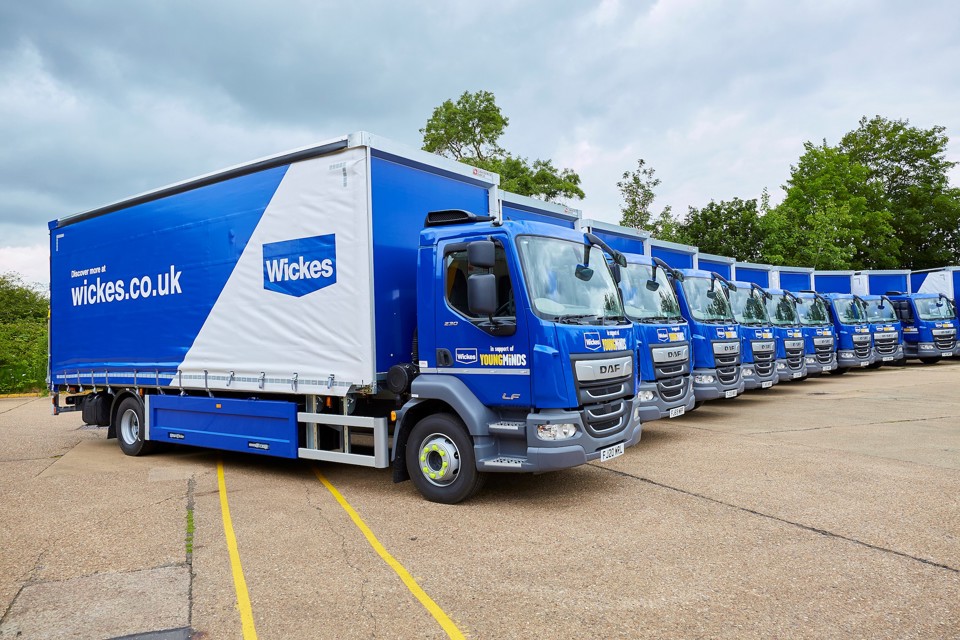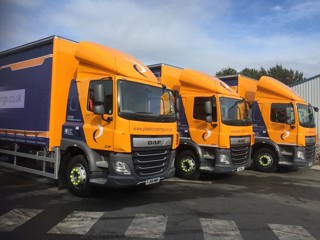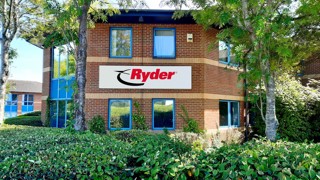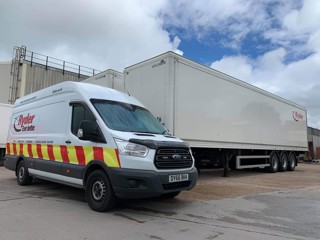Ryder has supplied 17 new specialist Daf LF220 15t rigid replacement vehicles for Wickes’ kitchen and bathroom home delivery fleet.
A supplier of commercial vehicle rental, contract hire and maintenance services in the UK, Ryder currently supplies more than 240 vehicles to Wickes.
This includes the supply of 160 Daf XF tractors and trailers for the home improvement retailer’s national 24/7 store distribution fleet, and more than 80 specialist Daf LF rigid curtainside trucks and trailers for Wickes’ kitchen and bathroom home delivery fleet.
Ryder will shortly begin a programme of trailer refurbishment across the Wickes fleet.
Ryder’s relationship with Wickes began in December 2018 when it assisted Wickes’ parent company, Travis Perkins, with the supply of more than 600 vehicles at short notice following the withdrawal of Travis Perkins’ previous vehicle supplier.
John Robinson, Ryder director for fleet sales, said: "We got off to a strong start in 2018 after taking over a large part of the Travis Perkins fleet, and the Wickes component within it.
“Wickes has very clear objectives in terms of what it requires from its vehicle fleet.
"We’ve worked hard to understand these requirements in detail, and the demands of the company’s transport operation. This has involved our sales, fleet management and engineering teams, who have all played an important role."
The project to specify and introduce the latest vehicles for the kitchen and bathroom home delivery fleet has been a critical one for the Wickes transportation and distribution team that involved a wide range of internal and external stakeholders.
Dudley Holliday, Wickes head of kitchen and bathroom distribution, explained: "Our vehicles have to last seven years, so getting the specification right for these new vehicles was absolutely key.
“Safety is our top priority as home delivery is an uncontrolled environment. Our vehicles and drivers need to be able to react quickly to a range of scenarios and delivery situations, including the need to be able to adapt rapidly if a delivery is cancelled.
"Our focus was on developing a vehicle specification that supports safe, high-quality delivery with maximum efficiency. The Wickes brand image is also very important, so we reflected this in the high vehicle specification with a unique, high-quality livery."
In terms of vehicle specification, David Grogut, senior engineer at Ryder, said: "We started with a detailed list of requirements from Wickes based on their experience with the existing kitchen and bathroom delivery fleet. This was supplemented by workshops with the Wickes transportation team, driver trainers, and the bodybuilder."
Key areas included camera specification and positioning, reversing signals, seats and driving position, ergonomics, satellite navigation as well as safe loading and unloading. A number of bespoke features were designed specifically for the new delivery vehicles.
"Two key areas where we were able to bring our expertise was in the tail lift and the bespoke access ladder design and associated storage," said Grogut.
"For the tail lift, Wickes required enhanced safety features and so a bespoke tail lift was developed based on an aluminium platform with self-deploying passenger protection (safety gates) on both sides. The tail lift was also fitted with power closing to reduce manual handling."
A new access ladder system for the load area was also developed. This is a more streamlined design developed uniquely for Wickes that is easier to use and more stable.
The development also involved an internally located storage compartment for the ladder that is accessible from both sides of the vehicle.
Holliday added: "Working with Ryder over a relatively short period of time, we have built up a strong basis of trust and we are really hitting the brief regarding our transport fleet.
“In particular, these latest vehicles firmly put into practice our corporate drivers of safety, quality, efficiency, adaptability, and flexibility to cope with the demands of today’s retail environment.
"Ryder did a great job in managing the integration of the new fleet additions. Over three days, they managed 16 vehicles into the fleet across the country, with 16 vehicles coming out, while keeping the operation running smoothly.
“We are now utilising these new vehicles in our day-to-day operations and testing their performance. We will feed the learning into our next vehicle orders."























Login to comment
Comments
No comments have been made yet.